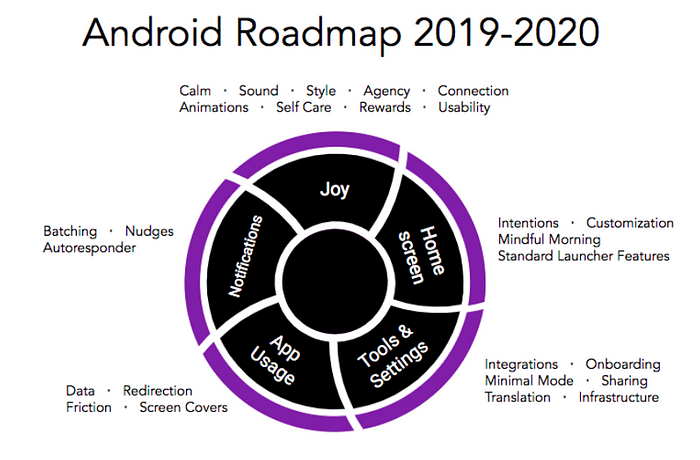Vision for the Next Siempo 💡🗺
This is a follow up to Part I (Postmortem for Siempo: A Humane Tech Startup☀️📲) in which I chronicle the startup’s journey, takeaways and outstanding questions. The intention of Part II is to outline a comprehensive and up-to-date vision for Siempo, so that those who wish to take up the work may find some inspiration from those who spent years in deep inquiry around what it could be.

Note: I want to acknowledge all that has not been included here, the potential impact of any misused ideas, and any harmful patterns I am unconsciously perpetuating through a limited and distorted worldview.
Andrew here, Operations Manager of Siempo from 2016–2017 and CEO 2017–2020. Siempo’s origin story predates my participation, though I would come to hold and massage the vision until we dissolved the company in 2020, and into the present moment as the tech addiction problem looms large and I am regularly approached for learnings from Siempo.
This is fun! Okay. If I had a magic wand.. knowing what I know now.. here’s one way I would like to see thing unfold for the next attempt:
Vision
A world in which technology supports life.
Mission
To create technology that bring humans into right relationship with technology, self, other, community, nature, The Universe / God.
Home Screen for Humanity. Nervous System Paradise. First Phone for Kids. Next Billion Leapfrog Attention Economy. Space Race for Humane Technology. Center of Gravity for Ethical Innovation. Phone for Humans. Giving lives back.
I see the vision standing on three key pillars:
- Product: dynamic interface designed to minimize distraction, regulate nervous system, support psychological growth.
- Organization: North Star for ethical culture and product innovation in Silicon Valley.
- Business / Go To Market: Interface as a Service to power custom smartphone experiences for diverse communities.
Siempo is an inevitability. Who do we need to become in order to bring it into the world in a good way?
Preparation
Most startups fail because they can’t get financing or coherent as a team. Move slow and get to know each other deeply in order to create fertile conditions for flourishing. Slow is smooth and smooth is fast.
The founding team would self-organize around those with demonstrated passion for re-imagining our relationship with technology.
They would spent at least one season developing deep interpersonal connection. Living together in nature, detoxing/recharging/integrating previous professional experiences, building trust, going on a learning/unlearning journey together to conduct a thorough root cause analysis, scrub startup monoculture and market-friendly conventional wisdom from their consciousness, study relevant fields like philosophy/ethics, sit with the big questions around success and unintended consequences. A philanthropist who made their fortunes in smartphones or social media would fund this soil preparation phase. An experienced facilitator would guide the journey, helping to process conflict and and coach individuals in their personal development.
During this time they would produce a pledge for how they plan to show up to this work (a la Northstar Ethics Pledge), create a council of elders and wisdom keepers (a la Grandmothers Council) for guidance and accountability, and align on an appropriate corporate operating system (Per the ethos of the Zebras Unite community, I’m intrigued by “exit to community” approaches like for-profit multi-stakeholder cooperative in order to democratize ownership and control. Also interested in the non-profit structure to prioritize stewardship over ownership, and the Public Benefit Corporation). They would start using a holocracy or sociocracy governance system and implement measures to protect against perverse incentives and human fallibility (a la Consilience Project’s Ethical Commitments).
This may seem like a lot. But the HOW and WHY matters. As evidenced by the pitfalls of Facebook, Uber, WeWork and others. The bar has been raised and demands a greater maturity of intention, understanding, and process. It’s important we try to do better, without letting perfect be the enemy of good.
No problem can be solved without a deep understanding of the consciousness that created it, and how that is still operating inside the problem solvers.
Getting Started
Appreciative inquiry, collaboration with wider community, sharing learnings outwards, promoting creativity.
The team would convene conversations amongst the digital wellness community (including the now ~dozen minimalist launchers in the Play Store — shout out to my preferred Before Launcher), academics in relevant fields, and communities most impacted by tech addiction to learn from those closest to the issue, inform product roadmap and identify collaborative opportunities.
A hackathon would be hosted with the intention of pushing the limits of Android’s developer permissions relative to digital wellness interventions. This would help spark the open source community to draw inspiration, decision making and support from a diversity of stakeholders. In time this could grow to hundreds or thousands of humane technologists across the world collaborating on a new “Space Race” to create a new operating system for humanity.

The core team would be led by underestimated founders and include leadership from Google, Cheetah Mobile or similar launcher companies who have had a crises of consciousness. They would setup systems to radically build in the open to cultivate trust with and invite contributions from the wider community, while maximizing collective learning. Org culture would vector towards evolutionary organizations. Team would only work 75% of the year, taking a break each winter for reflection, recharge, continuing education and tending to life needs.
Product
Imagine a future where users seamlessly experience different types of interfaces based on their unique needs on a moment to moment basis.
I don’t know the answer to what the smartphone should look like, though my sense is it’s not a one-size-fits-all design. We had dozens of product ideas to help users wake up more smoothly (a la Autopilot), keep in touch with loved ones (a la Lovebomb), invite moments of calm (a la Insight Timer). Our community had hundreds more. We only implemented a handful, scratching the surface of the vast terrain that is the monocultural smartphone user experience. I’m most proud of the Screen Covers feature as a preview for the types of creative interventions developers can experiment with.

Meanwhile the bootstrapped launcher ecosystem has only innovated so much. Designers have offered plenty of ideas that never left the drawing board. I’m inspired by Camiel van der Beek’s thesis Redesigning Smartphones for a Mindful Lifestyle, especially his designs for “Build Your Launcher.” Google lifts up some of these experiments.
Zooming out: how could the vast amount of data collected by our devices (usage, location, biometric, language input, etc) be leveraged to help us breathe better, stay focused and build healthier habits? I envision screens that dynamically adapt their look and feel (a la breathing.ai), offering the right type of gentle friction at the right time to help users find balance within the context of the unique needs of their life. In addition to prompting reflection, incentivizing authentic human connection, and educating users on addictive design paradigms.


As the user base grows, the product will be well positioned to offer a platform of proprietary and partner products and services, perhaps a digital pharmacy for a new generation of mental health therapeutics. After shaving off hours of screen time, they will have earned loyalty, freed up time, and generated motivation that can be allocated towards further personal growth-related activities. A desktop browser extension could be built to mimic the the functionality of the mobile launcher to create a synced cross-device experience, eventually extending to a protective layer across all screens (tablet, watch, TV, AR/VR).
Growth
How can innovations scale in an organic, decentralized, and sensitive manner?
The Android app might implement a premium subscription for advanced features and content, though accessibility is important and it should be easy for users to apply for a scholarship or pay-what-you-can. Creative efforts would be made to promote the product: participatory art, encourage users to share their stories, empower ambassadors to weave communities of early adopters (students, focus workers, minimalists, wellness practitioners, young parents, the devout).
But instead of bringing the innovation to the world user by user, the team could partner with the many organizations that care about wellbeing to bring this innovation to their communities in the way that works best for them. This Interfaces as a Service strategy would make it easy for any community leader to create and distribute their own interface, like spinning up a SquareSpace or WordPress website.
The launcher becomes the new app. Whether the University of Texas for freshman, Airbnb for employees, the city of São Paulo, The Lakota, Oprah, a therapist for their clients. Everybody gets a phone! Any community that cares about the wellbeing of the beings in it can offer a gift of balance (digital swag to drown out the distractions), while cultivating a closer relationship and potentially value exchange. American brands are wholly unaware of this technology or of its potential. Which phone are you using? Have you tried the Joe Rogen phone? The Quaker phone? The Harry Potter phone? Here, I’ll send you the link!
From the user perspective, it would be as easy as switching wallpaper for somebody to switch between interfaces, depending on their mood/intention. I might schedule to wake up with my spiritual teacher, commute with my favorite musician, be at work with my employer, unwind with the event I’m looking forward to. I could try on the digital experience of far flung cultures and those who I perceive as “other” to build understanding and empathy. With each, I could access additional services and invitations for self and community care, from educational offerings to mutual aid networks.
Developers in respective communities would be incentivized to add custom functionality to their interface, which could “compete” in a race to the top for the best experience of the digital world, in the process bubbling up different ways of being and knowing across space and time. Like a World Expo of cultural exchange. Perhaps future elections would invite voters to try on each candidate’s vision for the future (tight guardrails would need to be implemented to prevent abuse).

Final Thoughts
For crying out loud, why doesn’t this exist yet? I still get nagging visions of what Siempo could be. I believe we collectively have everything we need to design a smartphone interface that makes life happier and healthier for its users. Yet change is incremental from device makers and independent innovators alike, primarily due to economic disincentives. What is it going to take?
Fully aware of the slippery slope into savior complex, it does seem like creating a less distracting and more intentional smartphone interface is an important trim tab (a point in a system where the minimum effort causes the maximum effect) in shifting the tides of mental health, polarization, and our ability to come together to solve existential problems. We can empower all smartphone users with tools to wake up from the hypnosis of hyper-individualism and consumerism and separation. To make more effective choices that can create the more beautiful world our hearts know is possible. And to repair local community fabric for the sovereignty and resilience required to navigate the turbulent times ahead.
Please feel free to reach out to andrewmurraydunn at gmail dot com if you are interested in picking the brain of folks who worked on the Siempo project.
Please get in contact with the Focus Launcher team (open source version of Siempo) if you are interested in furthering this concept in the world.
May the digital wellness community learn from its experiences to set up the next generation of leaders for greater success.
May those dedicated to bringing healthier technology into the world be supported in finding inspiration, each other, and resources to do this work.
May those with access to power to accelerate change find the courage to take the social and financial risks they are being invited to.
May those struggling with all forms of addiction receive the support and healing they need.
May the highest good be revealed.

